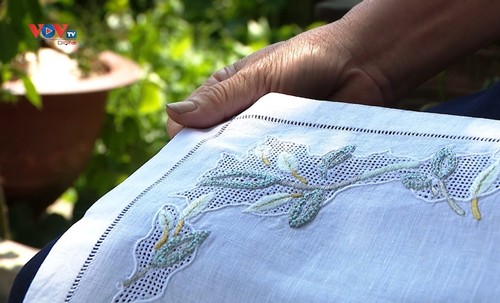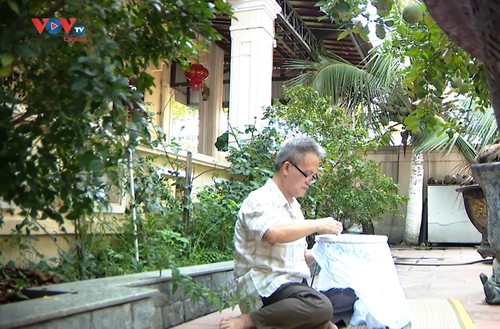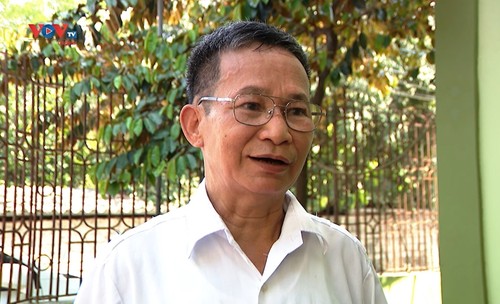 Emroidery was first practiced in Thanh ha commune, Ha Nam province in 1893 and developed prospersouly in the 1980s. Emroidery was first practiced in Thanh ha commune, Ha Nam province in 1893 and developed prospersouly in the 1980s. |
Nguyen Dinh Than, who was born in An Hoa hamlet in 1886, learned embroidery elsewhere and brought it back to An Hoa and taught it to his neighbors. The lace embroidery craft developed and spread throughout Thanh Ha and people proclaimed Than the founder of the craft.
Hoang Ngoc Tuyen of Thanh Ha commune told VOV that embroidery was handed down by our ancestors and flourished in the 1980s, adding, “We rely on the craft to earn our living. We mainly do hand embroidery. The master artisans are in charge of the main work, while children and women do the side work. Our products are exported to many countries around the world.”
Making a lace embroidery product is quite complicated. First, you must trace an outline on mica paper. Then ink is spread thinly over the paper. The ink soaks through the traced perforations and prints onto the fabric. Then you must embroider, wash, iron, package, and sell the embroidered items.
 Artisan Hoang Ngoc Tuyen is completing a hand-made embroidery product. Artisan Hoang Ngoc Tuyen is completing a hand-made embroidery product. |
In addition to the traditional embroidery techniques, embroidery has now developed more advanced techniques like double-sided embroidery, single-screen embroidery, double-screen embroidery, and embroidery using glossy thread.
Nguyen Manh Thuong, Chairman of Thanh Ha’s Association of Lace Embroidery Craft Villages, said, “We do bundled embroidery, brush embroidery, skim embroidery, and embroidery with hand-wound thread. The embroidery motifs can be animals, flowers, leaves, plants, or humans. Thanh Ha embroidery products include tablecloths, sheets, pillows, trays, and bags of various kinds.”
During its heyday from 1975 to 1999, embroidery products were exported to Russia, Eastern Europe, and other places around the world. Since 2000, during the period of mechanization, Thanh Ha commune has kept finding outlets to survive and grow despite a shrinking traditional market and foreign markets imposing stricter quality and delivery time requirements. The local government has supported investment in modern production facilities and established the Thanh Ha Embroidery Association to link production households.
 Nguyen Manh Thuong is Chairman of Thanh Ha’s Association of Lace Embroidery Craft Villages Nguyen Manh Thuong is Chairman of Thanh Ha’s Association of Lace Embroidery Craft Villages |
Some Thanh Ha embroidery products have been officially recognized as OCOP (One Commune One Product) items. According to Nguyen Thi Tuyen, Deputy Chairwoman of the Thanh Ha People's Committee, the locality is trying hard to preserve and develop the craft. “Under the national One Commune One Product program, we have registered OCOP products as part of Ha Nam’s provincial development program. Thanh Ha has organized tours of the craft village to promote its products,” said Tuyen.
Craft households are tirelessly improving their product quality and diversifying their designs to appeal to the market. Hand-embroidered products have become Thanh Ha’s brand. Pham Sy Minh of the Hoang Anh Embroidered Garment Company said, “Our materials are imported – thread from France and fabric from Italy. Hand embroidery requires skilled workers to ensure the quality meets customers’ expectations. Our company has obtained an international ISO quality certificate.”
“The production process has to be more rigorous, and each product must be checked to ensure it’s perfect. The company is responsible for the product until the customer is completely satisfied. If a customer complains about a product, we must compensate them or allow them to return the product. Investing in technology raises the product value and ensures that the profit is also higher,” Minh noted.
In recent years, in addition to hand embroidery, local households have used machines to increase productivity and earn higher profits.
Ha Thi Hiep of the An Phương Garment Export Company told VOV that they have used embroidery machines for more than 10 years. “Customers often need embroidery products quickly at a reasonable price and acceptable quality, so we’ve switched to machine embroidery to speed up production. Our company has 10 embroidery machines. Each worker now earns almost 200 USD per month,” Hiep explained.
Thanh Ha embroidery was recognized as a national intangible cultural heritage by the Ministry of Culture, Sports and Tourism on May 27, 2021. Its products have been exported to Japan, South Korea, Italy, France, the US, Germany, the UK, and Switzerland.